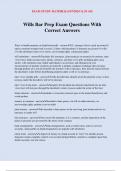EXAM STUDY MATERIALS 8/7/2024 11:29 AM
Wills Bar Prep Exam Questions With
Correct Answers
Ways to handle property at death historically - answer✔✔(1) strongest (first to pick up owned it
unless someone stronger took it away) (2) bury with decedent (3) intestate succession (4) wills
(5) will substitutes (inter vivos trusts, survivorship rights, contractual rights)
will substitutes - answer✔✔includes life insurance, joint tenancies or tenancies by entirety, inter
vivos trusts, bank account trusts, deeds, contracts, and inter vivos gifts including gifts causa
mortis. will substitutes may enable individuals to avoid taxes and eliminate the cost
inconvenience of probate. property governed by a probate avoidance technique does not pass
through probate an is not governed by the testator's will or intestacy. they must be removed from
the decedent's estate before distributing property under a will or via intestacy
inter vivos outright gifts - answer✔✔if the decedent has already given the property away, it does
not pass under the decedent's will or by intestacy
inter vivos living trusts - answer✔✔property the decedent has already transferred into an inter
vivos trust will not pass through the decedent's estate, it passes under the terms of the trust
future interests - answer✔✔remainder or executory interests pass to the named beneficiary and
avoid probate
tenancy in common - answer✔✔decedent's share passes via will or under intestacy. no
survivorship rights, probate is not avoided
joint tenancy - answer✔✔the decedent's share passes to the surviving joint tenant and not via
intestacy or under will
life insurance - answer✔✔most used will substitute. it is a contract, and the disposition of the
policy's proceeds are governed by the terms of the contract
bank arrangements - answer✔✔bank arrangements, such as totten trusts, joint or survivor
accounts, and payable on death designations are popular will substitutes
totten trusts - answer✔✔a deposit of money in a bank account in "trust" for another person.
depositor retains complete control over account during lifetime, transfer is complete upon their
death (accounts, not true trusts)
, EXAM STUDY MATERIALS 8/7/2024 11:29 AM
joint or survivor accounts - answer✔✔a bank account deposit in the name of two or more
persons "with right of survivorship" is generally effective to give the survivor the absolute right
to all of the money. under the UPC creditors can reach the money in a joint account to the extent
that the decedent deposited money into the account if other assets are insufficient. in many states,
evidence is admissible to show that the joint account was set up merely as a convenience for
paying the depositor's bills, and no gift to the survivor was intended
payable on death designations - answer✔✔bank accounts and corporate securities may be held in
payable on death form, so the property passes to the designated person upon the owner's death
deeds - answer✔✔a deed deposited in escrow, with delivery conditioned upon the grantor's
death, may be a valid nontestamentary transfer. if a deed has actually been delivered to the
grantee, a court may sustain the transfer as nontestamentary by construing the deed as a present
transfer of a future interest, subject to a life estate in the grantor
intestate succession - answer✔✔property may pass by intestate succession when (1) a decedent
dies without having made a will or their will is denied probate (2) a decedent's will does not
dispose of all of the decedent's property, either because a gift has failed or because the will
contains no residuary clause
heirs - answer✔✔persons who take by intestacy (on death)
theory behind intestate succession - answer✔✔intestate succession gives property to people who
society views as proper after the intestate's debts and taxes are paid. the distribution scheme
cannot be altered to fit the decedent's intent regardless of evidence that shows the decedent
would not have wanted their property to pass the way intestacy provides
applicable law to intestate succession - answer✔✔for property while married, we use the law of
the domicile at the time the property was acquired (inception of title rule). the marital rights do
not change as the couple moves from one state to another. for personal property, we use the law
of the decedent's domicile at death. for real property, we use the law of the situs of the property
intestate share of surviving spouse - answer✔✔at common law, the surviving spouse was not an
heir. under modern law, the spouse is an heir. the share of the surviving spouse depends on
factors such as the number of children and whether the surviving spouse is the other parent of the
deceased spouse's children. in most stats, if the decedent leaves descendants (children,
grandchildren, etc) as well as a spouse, spouse takes one third or one half the estate. some states
give a specific dollar amount plus fraction. in states adopting the UPC, the spouse takes entire
estate if the decedent's descendants are all descendants of surviving spouse and spouse has no
other descendants. in most states, if decedent has spouse but no descendants, spouse gets entire
estate. in UPC states, the spouse takes entire estate only if decedent does not have descendants or
parents
intestate share of children and other descendants - answer✔✔the portion of the estate that does
not pass to the surviving spouse, or the entire estate if there is no surviving spouse, passes to the
, EXAM STUDY MATERIALS 8/7/2024 11:29 AM
decedent's children and descendants of deceased children. if all children survive (or predeceased
children have no descendants) each child receives an equal share. the younger generation does
not take if the older generation is still alive
methods of computing intestate shares - answer✔✔if at least one descendant predeceased the
decedent and is survived by a descendant who survives the decedent, three methods can be used
to compute shares. (1) classic per stipes (equal shares for each line) (2) per capita with
representation (property divided into equal shares at first generation with survivors) (majority
rule) (3) per capita at each generation (divide shares at first surviving level, recombine, and
redistribute at next level. people in the same degree of kinship to decedent take equal shares)
(modern trend)
intestate shares of other heirs - answer✔✔if the decedent is not survived by a spouse or
descendants, the entire estates passes in the following order, proceeding until takers are found (1)
parent(s) (2) brothers and sisters and their descendants (3) one half to paternal and maternal
grandparents and their descendants (both halves to one side if there are no takers on the other
side) (4) one half to nearest kin on material side and paternal side (all to one side if none on
other) (5) to the state (escheats)
adopted children and intestate succession - answer✔✔adopted children are treated the same as
the biological children of the adopting parents. generally there is no inheritance in either
direction between adopted children and their biological parents
stepchildren and foster children in intestate succession - answer✔✔stepchildren and foster
children have no inheritance rights unless adopted by the stepparent or foster parent. adoption by
estoppel permits a child to inherit from or through a stepparent or foster parent when legal
custody of a child is gained under an (unfulfilled) agreement to adopt them. if the child dies,
many states prohibit the stepparent or foster parent from inheriting
nonmarital children and intestate succession - answer✔✔always inherits from the mother.
inherits from the father if (1) the father married the mother after child's brith (2) the man was
adjudicated to be the father in a paternity suit or (3) after his death and during probate
proceedings, the man is proved by clear and convincing evidence to be the father
half bloods and whole bloods in intestate succession - answer✔✔the UPC and most states make
no distinction between half bloods and whole bloods, they inherit equally. some jurisdictions
give half bloods half shares or cut them out from inheriting entirely if whole blood siblings exist
posthumous children and intestate succession - answer✔✔if a person is in gestation at the time
of the intestate's death, most states allow that person to be an heir. some states allow a child of
the intestate who was not in gestation but born within a statutory period of time (ex. two years)
to inherit under specified circumstances
disinheritance clause - answer✔✔at common law and in most states, a will provision expressly
disinheriting an heir is ineffective as to any property passing by intestacy (the will must dispose





